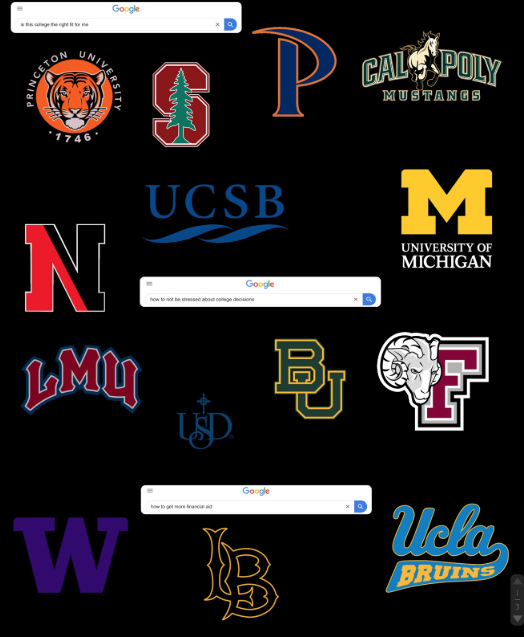College decision 411
Many seniors nationwide apply to 10 or more colleges every year, categorizing them into safety, target, and reach schools. Most applications are due any time between November and January, with most decisions coming out in February and March.
April 30, 2019
As National College Decision Day nears, many Cathedral Catholic High School seniors, still are unsure of their college plans. With many possibilities to consider before May 1, don’t fret as El Cid has you covered.
Price
With the average state school costing around $9,410 and the average private school tuition priced at $32,410, pocket change does not exactly cover the cost of college tuition let alone room and board, books, food plan, and other expenses, according to Forbes.com.
Considering the national student debt stands at about $1.5 trillion, not many people can afford college out of pocket. However, there are ways to circumvent this heavy financial burden.
Many private schools offer multiple merit aid scholarships, ranging from $1,000 per year to full-tuition rides. If you do not qualify for a merit scholarship as an incoming freshman, you still can apply for merit aid after the end of each academic year, CCHS counselor Miss Kristen Micho said.
If you choose to attend an out-of-state public school, you have to pay the hefty out-of-state tuition. However, you can declare residency and qualify for in-state tuition after a minimum of one year. To do so, you need a home address, proof of financial stability, and a driver’s license for that state.
UC and Cal State schools waive the tuition fee for military dependents, saving them thousands of dollars of tuition. Additionally, schools like Michigan State University and University of Washington allow out-of-state military dependents to qualify for in-state tuition, which drastically reduces the cost.
Another consideration is the possibility of attending a post-graduate study or program. Graduate school tuition tends to be more expensive than undergraduate fees, but it is typically two years instead of four, unless you plan to pursue a medical degree.
“I would prefer going to an in-state school to receive in-state tuition because I’m planning to go to graduate school or medical school in order to become a scientific-researcher, specifically within neurobiology and genetics,” CCHS student Faith Aloboudi ‘19 said. “Even though I can get paid while receiving my PhD as a researcher, I would still have to pay for living expenses and more while having to pay for student loans. So, I strongly prefer attending an in-state school than a private school from tuition being less costly, avoiding major debt.”
Aloboudi will attend UC San Diego in the fall.
Major
Just because a school boasts a high ranking does not mean it accommodates every major. For instance, UC Santa Barbara holds the title as the No. 5 public school nationwide, yet it does not offer a business major to undergraduates.
Location for your intended major also matters.
Why study communications in a rural area, when you easily could gain connections in places like Los Angeles, New York City, or Washington, DC. Planning on studying computer science? Try and complete your studies in Silicon Valley.
While college gives you the opportunity to explore your interests in almost any subject on the planet, make sure you have a career in mind that fits your major. In addition, if you plan on attending law or medical school, you should major in field that will benefit you in preparing for the entrance to graduate school.
“I was looking for a college that had my major, but also where I felt at home,” CCHS student Devin Gaasch ‘19 said. “I chose Cal Poly San Luis Obispo because when I walked on campus, it felt like home, and I could see myself being there for four years. I really liked the people, environment, classes, and the school in general.”
Gaasch plans to study business and biotechnology in the fall.
Location
Since college campuses vary in location from rural to urban, you should definitely visit colleges you’re considering in order to gain a feeling for daily campus operations.
Living in San Diego means being used to temperate weather, bustling city life, and interesting places. Some college towns, however, seem like they exist solely for the purpose of the universities they host, leading to a university “bubble” in which students rarely leave campus.
Finally, make sure to consider how weather affects you before deciding on a college. Most places don’t provide beach weather in February. If you’re sick of San Diego’s sunny seasons, choose a place for college where you actually can wear that winter jacket you keep stuffed in the entryway closet of your house.
Level of Independence
Are you actually ready to live on your own? Seriously. The list of new responsibilities includes doing your own laundry, waking up on time, and making sure you get nutritious food. People seem to get so wrapped up in the blissful freedom of college, but they forget they actually have to care for themselves.
One strategy you can do to ease the anxiety that surrounds independence is to make a daily to-do list. Seeing everything you have to do listed on personal stationary or even the back of a syllabus for a class you may drop helps goals seem more attainable.
If you cannot fathom the thought of leaving home, Southern California and California in general have many highly ranked, affordable, and overall great schools you can attend, making the college transition not seem so drastic.
Community
Some small private universities have a population similar to CCHS, while some public schools have the population of a small city.
With a big school comes many great opportunities to meet more people, to attend big sporting events, and to garner more endowment money to use for research. However, big schools also mean a higher student to faculty ratio and a greater sense of solitude despite massive enrollment numbers. You’ll be in a more competitive environment at a larger school. Of course, you can still create bonds with your professors and get internship/employment opportunities, you will just need to fight more than you would at a private school, according to Miss Micho.
Thousands of new people is enough to freak out anybody, especially those students coming from a school where almost everyone is recognizable. If meeting new people intimidates you, do not worry. There are many strategies you can employ to circumvent this fear.
First, most schools have Facebook pages for incoming freshman where you and your future classmates can post pictures, scout for future roommates, and connect with new friends. Once you arrive to campus, join clubs and student groups to meet people with similar interest.
“Just remember that everyone is in the same boat,” Miss Micho said. “Everyone is new and trying to figure things out.”
Transferring
You might be thinking, “What if I end up not liking where I end up? What if the campus is completely different than the pictures on the Internet and what College Confidential says?”
First of all, breathe. With a big of a decision as college, doubt and speculation is common. You will experience highs and lows throughout college, with maladies like homesickness.
“My advice? Give it a year,” Miss Micho said.
If the year comes to an end and you are really unhappy with your decision, you have a couple options. First of all, you have to go through the college application process again.Ssorry. Chances are you will have an idea of where you want to attend, and transfer students have higher rate of admittance.
If you want to transfer to a private university, 30 units, or the equivalent of two semesters, are required. UC and Cal State schools are less friendly, however. Sixty units, or the equivalent of two school years, are required. And UCs will accept community college transfers before four-year university transfers.
Final note
Even getting accepted to college counts as a success. You decided to further your education and to secure your future. When considering a college, try to not get caught up the the rankings because your college experience and future ultimately depends on how you take advantage of the opportunities presented to you, not the ivy that grows on one of those esteemed east coast universities.






















































